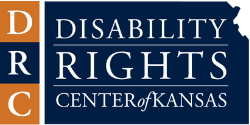Self Advocacy For Deaf or Hard of Hearing
Common Problem : Getting ASL Interpreter
Solution : Self Advocacy by Modifying DRC’s Form Letters
One of the more frequent types of calls DRC gets is about whether or not a business or service must provide a person who is deaf with an ASL interpreter or with requests for accommodations at work. From our experience, the best way to insure that an ASL interpreter is provided is for the person needing the interpreter to self advocate for this accommodation by tailoring the form letters below.
How to use our self-advocacy letters.
We have provided you with several examples of letters that you might use. You should tailor these letters to address your specific situation. Save them to your computer and make the necessary edits and additions. If none of these letters suits your particular problem, you should contact DRC directly for further assistance.
Advocacy Letters
Current Doctor- This letter will serve as a tool to use with a doctor or health professional that you have used before.
New Health Profession - This letter will serve as a tool to use with a new doctor or health professionals.
Employment Application - This letter will serve as a tool when you are applying for a job.
Work Communication - This letter will serve as a tool to use with employers when a communication problem arises.
2nd Attempt for ASL interpreter - This letter will serve as a tool to use with your doctor after you have asked for an interpreter before.
Why Self-Advocacy?
DRC believes that people should be empowered to assert their own rights and to effectively address the specific disability related issues that they face in their day to day lives.
Moreover, self-advocacy works because:
1) It addresses one of the major causes for the failure to provide an interpreter---the ignorance of the requirements of the Americans with Disabilities Act and/or ignorance of the stark differences between ASL and exact English.
2) It can be very effective because it offers a quick means of requesting ASL when you need it for a critical service such as health care
3) It is less threatening and can help preserve an important business or health related relationship.
4) If self-advocacy is not effective, you will have created important documentation. Your written documentation of your specific request and subsequent denial of a reasonable accommodation may be of help in further pursuit of justice such as through the EEOC, Kansas Human Rights Commission or the court system.
Disclaimer: The letters on this web page are meant to be a tool to assist you and are provided only as a public service. These letters are not legal advice. By providing this information, DRC is not agreeing to provide legal representation, we are not acting as your attorney and you do not have an attorney-client relationship with DRC. If you need legal advice, you should contact an attorney or seek out further assistance by calling DRC. We try to make information on this site accurate as of the date noted in the materials. Sometimes the laws change. We cannot promise that this information is always up-to-date and correct. Permission to use, copy and distribute documents delivered from this web site is hereby granted for private, non-commercial and educational purposes only.
This page was developed based on feedback from advocates in the deaf and hard of hearing community. Thank you to advocates all over Kansas for their dedication, ideas and support!
.png)






